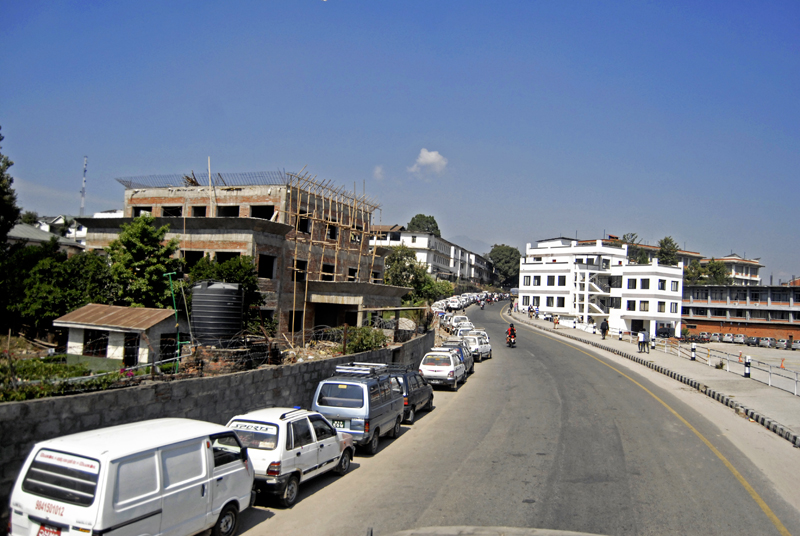Birat Petroleum inflated input costs, reveals PAC
Kathmandu, March 17
Birat Petroleum Pvt Ltd had unabashedly inflated input costs while fixing the retail price of petrol that it sold a few days ago at 31 per cent more than the market price, show documents submitted by the company and the government to the Public Accounts Committee of the Parliament.
The private oil company had told the Department of Supply Management and Consumer Protection that the cost price of each litre of petrol in India stood at Rs 75.34.
But invoices of Haldia Petrochemicals Ltd, from where Birat Petroleum had purchased the fuel, show that the company had bought petrol for as little as Rs 72.78 per litre and had not paid more than Rs 73.11 a litre.
Documents also show that the company had set aside Rs 11.64 as transportation and insurance cost for every litre of petrol that it was importing.
In contrast, state-owned Nepal Oil Corporation spends only Rs 1.94 on insurance and transportation cost while importing a litre of petrol.
Also, Birat Petroleum said it spent seven rupees to cover administration and sales expenses on every litre of petrol, whereas NOC does not spend more than Re 0.50 to perform the same tasks.
With all these costs, Birat Petroleum had initially sought permission from the government to sell petrol for Rs 155.65 a litre in the domestic market — 57 per cent higher than NOC’s retail price of Rs 99.
This retail price of Birat also included profit of Rs 19.50 per litre, or 15 per cent of its input cost.
“Why would a company, which is selling mass consumption product, need profit margin of 15 per cent? Isn’t two to three per cent of profit margin sufficient?” questioned lawmaker Sarvendra Nath Shukla during today’s parliamentary hearing.
In a free market economy, the government does not regulate prices, as it is believed competition in the market compels sellers to fix best prices that are attractive to consumers.
“But it’s appalling to know that price fixed by the private company is even higher than that set by the state-owned Nepal Oil Corporation,” said lawmaker Dhan Raj Gurung, questioning, “Isn’t that exploitation of people?”
Prakash Sharan Mahat, former minister and senior leader of Nepali Congress, said, “The petroleum sector of the country was liberalised (after the blockade on Nepal-India border points) with the hope that people would benefit from the efficiency of the private sector.
But we suspect foulplay because oil bought by state-owned Nepal Oil Corporation could not enter the country freely, while consignments of Birat Petroleum were delivered without any hassle.”
Other lawmakers, including Dipak Khadka, Hari Prasad Nepal, Rajendra KC and Radha Krishna Kadel also blamed the government for being a mere spectator when the private company was ripping off common citizens.
The supplies ministry had allowed the private sector to import and sell petroleum products by issuing a notice in the gazette on October 19.
Based on this, Birat Petroleum was first given the permission to import petroleum products on December 18.
At that time, fuel crisis triggered by the blockade was at its peak and the company had managed to import petroleum products and sell them through four gasoline stations located in the Kathmandu Valley.
Then on February 23, the company again sought permission to sell 132,000 litres of petrol that it had imported.
By that time, the blockade had been lifted and supply situation was normalising. Yet, the company sought permission to sell the petrol at Rs 155.65 per litre.
After facing criticism, the company reduced the price to Rs 150 per litre and then to Rs 130 per litre.
NOC Managing Director Gopal Bahadur Khadka said he remained ‘mum on price fixed by Birat Petroleum because it was the Cabinet that had extended permission to the private company to import fuel’.
The government has so far extended licences to 35 companies to import fuel.
Government scraps decision to let private sector import, sell fuel
KATHMANDU: The government on Thursday decided to withdraw its decision to allow private sector to import and sell petroleum products.
According to Minister for Supplies Ganesh Man Pun, the Cabinet meeting decided in favour of his proposal to withdraw the decision of the government to allow private sector to import and sell petroleum products.
The agreement with 35 companies, including Birat Petroleum, has now been scrapped.
Though the government had decided to allow private sector to import and sell petroleum products following the blockade, high selling price of the Birat Petroleum kicked up a row, inviting public uproar.






